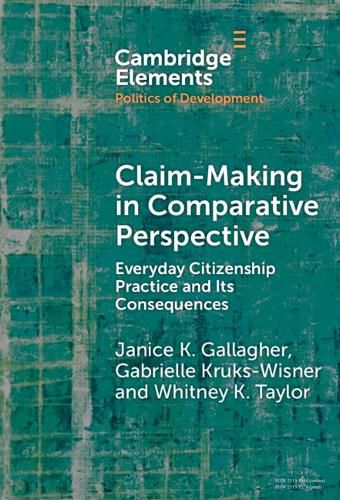Readings Newsletter
Become a Readings Member to make your shopping experience even easier.
Sign in or sign up for free!
You’re not far away from qualifying for FREE standard shipping within Australia
You’ve qualified for FREE standard shipping within Australia
The cart is loading…






Claim-making - the everyday strategies through which citizens pursue rights fulfilment - is often overlooked in studies of political behavior, which tend to focus on highly visible, pivotal moments: elections, mass protests, high court decisions, legislative decisions. But what of the politics of the everyday? This Element takes up this question, drawing together research from Colombia, South Africa, India, and Mexico. The authors argue that claim-making is a distinct form of citizenship practice characterized by its everyday nature, which is neither fully programmatic nor clientelistic; and which is prevalent in settings marked by gaps between the state's de jure commitments to rights and their de facto realization. Under these conditions, claim making is both meaningful (there are rights to be secured) and necessary (fulfillment is far from guaranteed). Claim-making of this kind is of critical consequence, both materially and politically, with the potential to shape how citizens engage (or disengage) the state.
$9.00 standard shipping within Australia
FREE standard shipping within Australia for orders over $100.00
Express & International shipping calculated at checkout
Claim-making - the everyday strategies through which citizens pursue rights fulfilment - is often overlooked in studies of political behavior, which tend to focus on highly visible, pivotal moments: elections, mass protests, high court decisions, legislative decisions. But what of the politics of the everyday? This Element takes up this question, drawing together research from Colombia, South Africa, India, and Mexico. The authors argue that claim-making is a distinct form of citizenship practice characterized by its everyday nature, which is neither fully programmatic nor clientelistic; and which is prevalent in settings marked by gaps between the state's de jure commitments to rights and their de facto realization. Under these conditions, claim making is both meaningful (there are rights to be secured) and necessary (fulfillment is far from guaranteed). Claim-making of this kind is of critical consequence, both materially and politically, with the potential to shape how citizens engage (or disengage) the state.